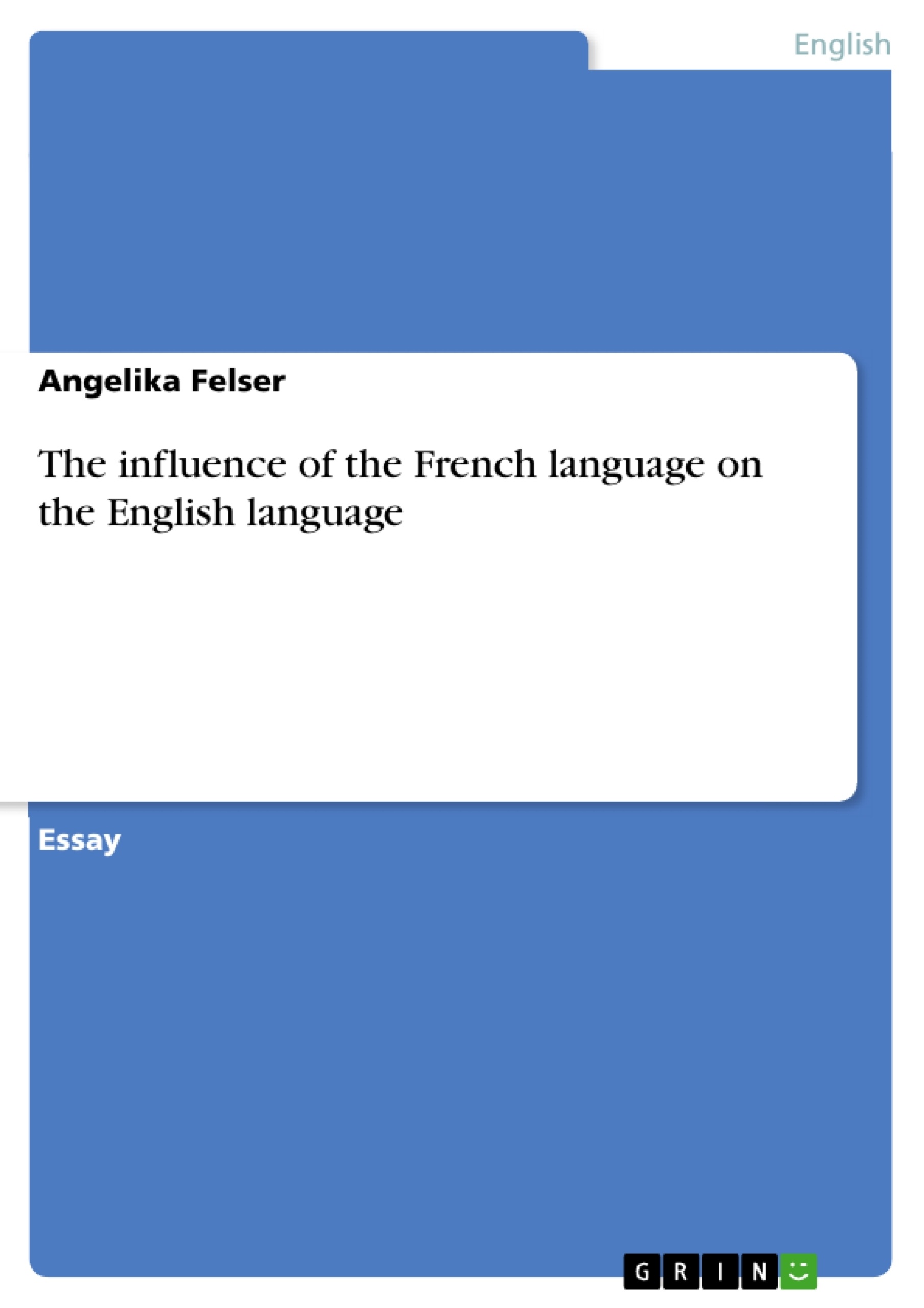Excerpt
The influence of the French language on the English language
The Norman Conquest in 1066
The English nobility was replaced by the French nobility. A bilingual situation was predominant:
Whereas people from the upper class spoke the French language, people from lower classes spoke English. The French nobility led a separate life from ordinary people.
The English language was considered to be inferior to the French language, and only people like merchants who wanted to communicate with people from the lower classes had to know the English language.
This is what the situation was like for about 200 years.
By 1200 only 0,6% of all French loanwords were introduced into the English language.
At the end of the 12th century, bilingualism was quite a common phenomenon because of fusions and marriages.
Between 1250 and 1400, people turn towards the English language.
In 1204 King John looses the Normandy, which is a change and a re-establishment of the English language at the same time. In the 13th century, the nobels speak English as their mother language, and the French language is the language of law and prestige. French loanwords are introduced into the English language by means of translations from French to English. In 1272, Edward I is crowned to be the first English king after 1066. At the end of the 13th century, all classes speak English, and many nobels don't know the French language. In 1349 the English language is spoken at school. In 1362 the English language becomes the language of law and Parliament (“The Statutes of the Realm”). From the 15th century on, the Latin language is being replaced by the English language in writing.
Between 1250 and 1400 53% of all French loanwords are introduced into the English language (32% at Chaucer's time and in 1400).
English people borrowed French words before 1250 and after 1250:
1) Before 1250 roughly 900 words in number came from Anglo-Norman origin. These words were popular in character. They were derived from everyday life, that is from the contact between people from lower classes and the French nobility, for example “baron“, “feast“, “juggler“, “messenger“, “noble“ or “servant“.
Loan words like “lay“, “rhyme“ or “story“ owed their introduction into the English language to literary channels.
2) After 1250 a more extended vocabulary was taken from everyday life. “Bookish” words (“les mots savants“) were introduced into the English language through the channel of translation and writing These words had been taken from particular domains of language, since languages mirror civilisation and culture of the respective countries.
Loanwords
administrative and governmental words
empire, minister, royal, sovereign
Except for words like “earl”, “king”, “lady”, “lord”, “queen” designations of rank are French borrowings, for instance “baron”, “count”, “countess”, “duke”, “noble”, “nobility”, “page”, “peer”, “prince” and “princess”.
The word *”squire” was borrowed from the French language to describe a young courtly lover.
army
army, captain, cavalry, defense, enemy, pilot (1530), prisoner (1523), trophy
art, learning, medicine beauty, image; poet, preface, rhyme stomach, medicine
ecclesiastical words
cardinal, clergy, confession, pastor, religion, sermon, theology fashion, meals, social life
diamont, habit, luxury, money, pearl appetite, biscuit, cream, dinner, drink, salat, salmon, sausages, spice chair, dance, music
adultery, advocate, fraud, judge, justice, prison culpable, innocent, just to condemn, to judge, to imprison
Loan formation
New meanings, structures and words were introduced into the English language by means of loan formation. Loan formation comprises loan translation, loan rendition, loan creation as well as semantic loan:
Loan translation : Loan translation is a morph-by-morph translation of phrasal verbs, for instance:
make believe < faire croire by heart < par coeur in vain < en vain
Loan rendition: Loan rendition is the free translation of the French word pattern:
In Chaucer's “Canterbury Tales”, Chaucer describes the Squire as follows:
“Of twenty yeer of age he was [...]” . This was the free translation of the French word pattern “il était âgé de vingt ans”.
Loan creation: Loan creation means that a new word is created. This new word is not necessarily a formal or semantic equivalent, for example:
cognac > Weinbrand
Semantic loan: Semantic loan means that the meaning of a foreign word is transferred to the native word:
The Middle English word „knight“ borrowed its meaning from the Anglo-Norman word „chevaler“.
[...]
- Quote paper
- Angelika Felser (Author), 1998, The influence of the French language on the English language, Munich, GRIN Verlag, https://www.grin.com/document/377994
Publish now - it's free






















Comments